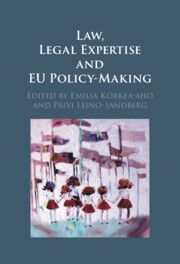Book contents
- Law, Legal Expertise and EU Policy-Making
- Law, Legal Expertise and EU Policy-Making
- Copyright page
- Contents
- Contributors
- Acknowledgements
- 1 Law, Legal Expertise and EU Policy-Making: Introduction
- Part I Theorising Legal Expertise
- Part II In-House Legal Expertise
- Part III External Legal Expertise
- 10 The Rise of Transnational Legal Experts: Two Lessons from Research on Private Practitioners As Euro-Lawyers
- 11 Rock ’n’ Roll Stars or Guitar Technicians? Legal Advisors As Legal Experts in NGO Lobbying
- 12 Legal Expertise, Environmental Groups and Brexit: Beyond the Limits
- 13 Bureaucrats in the Classroom? Epistemic Governance and the Expert Legal Scholar
- 14 Verfassungsblog, Legal Expertise and Why Europe’s ‘Computer Is Not Working As It Should’
- 15 Afterword: The Four Questions and One Answer
- Index
13 - Bureaucrats in the Classroom? Epistemic Governance and the Expert Legal Scholar
from Part III - External Legal Expertise
Published online by Cambridge University Press: 13 October 2022
- Law, Legal Expertise and EU Policy-Making
- Law, Legal Expertise and EU Policy-Making
- Copyright page
- Contents
- Contributors
- Acknowledgements
- 1 Law, Legal Expertise and EU Policy-Making: Introduction
- Part I Theorising Legal Expertise
- Part II In-House Legal Expertise
- Part III External Legal Expertise
- 10 The Rise of Transnational Legal Experts: Two Lessons from Research on Private Practitioners As Euro-Lawyers
- 11 Rock ’n’ Roll Stars or Guitar Technicians? Legal Advisors As Legal Experts in NGO Lobbying
- 12 Legal Expertise, Environmental Groups and Brexit: Beyond the Limits
- 13 Bureaucrats in the Classroom? Epistemic Governance and the Expert Legal Scholar
- 14 Verfassungsblog, Legal Expertise and Why Europe’s ‘Computer Is Not Working As It Should’
- 15 Afterword: The Four Questions and One Answer
- Index
Summary
Over the last decade or so, international lawyers have started to pay some attention to the role of experts in international decision-making processes (both EU and other international organisations), focusing on the identity of experts, their disciplinary backgrounds, how seemingly neutral expertise helps shape policy, and to what extent (if at all) experts can be held accountable. Perhaps surprisingly, while much attention is devoted to the role of economists, engineers, and scientists, little attention is paid to international legal academics as experts. And yet, without conceit, it is possible to argue that international law scholars too may come to affect the world around them, precisely in their professional, expert capacities: through their research and publications, through their peer activities (reviewer, board member), and through their teaching. Using the notion of epistemic governance and framing expertise as a power to tell stories, this chapter zooms in on the influence exercised by international law academics as experts influencing policy-processes, discussing in particular those aspects of influence that usually go unnoticed.
- Type
- Chapter
- Information
- Law, Legal Expertise and EU Policy-Making , pp. 269 - 291Publisher: Cambridge University PressPrint publication year: 2022

